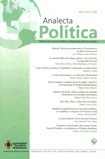The Work of Leo Strauss and his Criticism of Modernity
Main Article Content
Abstract
The work of Leo Strauss is a whole determined by using the art of writing between the lines and the interconnection of its central topics: philosophy, politics and faith. Thus, the genuine understanding of any of the parts of the whole work requires at least the study of a good portion of the total work, as each part acquires its full significance by its place and function within the whole. Leo Strauss’ hermeneutical proposal or art of writing between the lines was the enabling element to identify the organic unity of his work, the key issues within it, their interrelationships and best way of studying it. The paper aims to indicate the oneness of the Straussian work and, thereby, show to the reader the need to cover a good part of the corpus of his work in order to approach an understanding. Also, it aims to indicate the main topics of Strauss’ work and their concatenation and to point out the core of the intellectual production of Leo Strauss. Finally, it aims to highlight the relevance and fecundity of the Straussian criticism of modernity for a better understanding and application of this particular work on con- temporary social and political problems. Among the primary findings of this research we include the possibility of thinking the contemporary world from the perspective of classical thought, revitalizing contemporary social sciences through a joint work with philosophy and visualizing a thought that embraces faith, philosophy and politics. Our findings point to the relevance that Leo Strauss provided to thought, understood as the determinant element of the course of societies. ftey also point to the character of multiplicity on the underlying unities in the Straussian work and the importance of a philosophical orientation to grasp and understand human life.
References
Strauss, L. (1970). ¿Qué es la filosofía política? Madrid: Guadarrama.
Strauss, L. (2006). La ciudad y el hombre. Buenos Aires: Katz.
Strauss, L. (2007a). Liberalismo antiguo y moderno. Buenos Aires: Katz.
Strauss, L. (2007b). El renacimiento del racionalismo político clásico. Buenos Aires: Amo- rrortu.
Strauss, L. (2008). Estudios de fihosofía pohítica phatónica. Buenos Aires: Amorrortu.
Strauss, L. (2009). La persecución y eh arte de escribir. Buenos Aires: Amorrortu.


